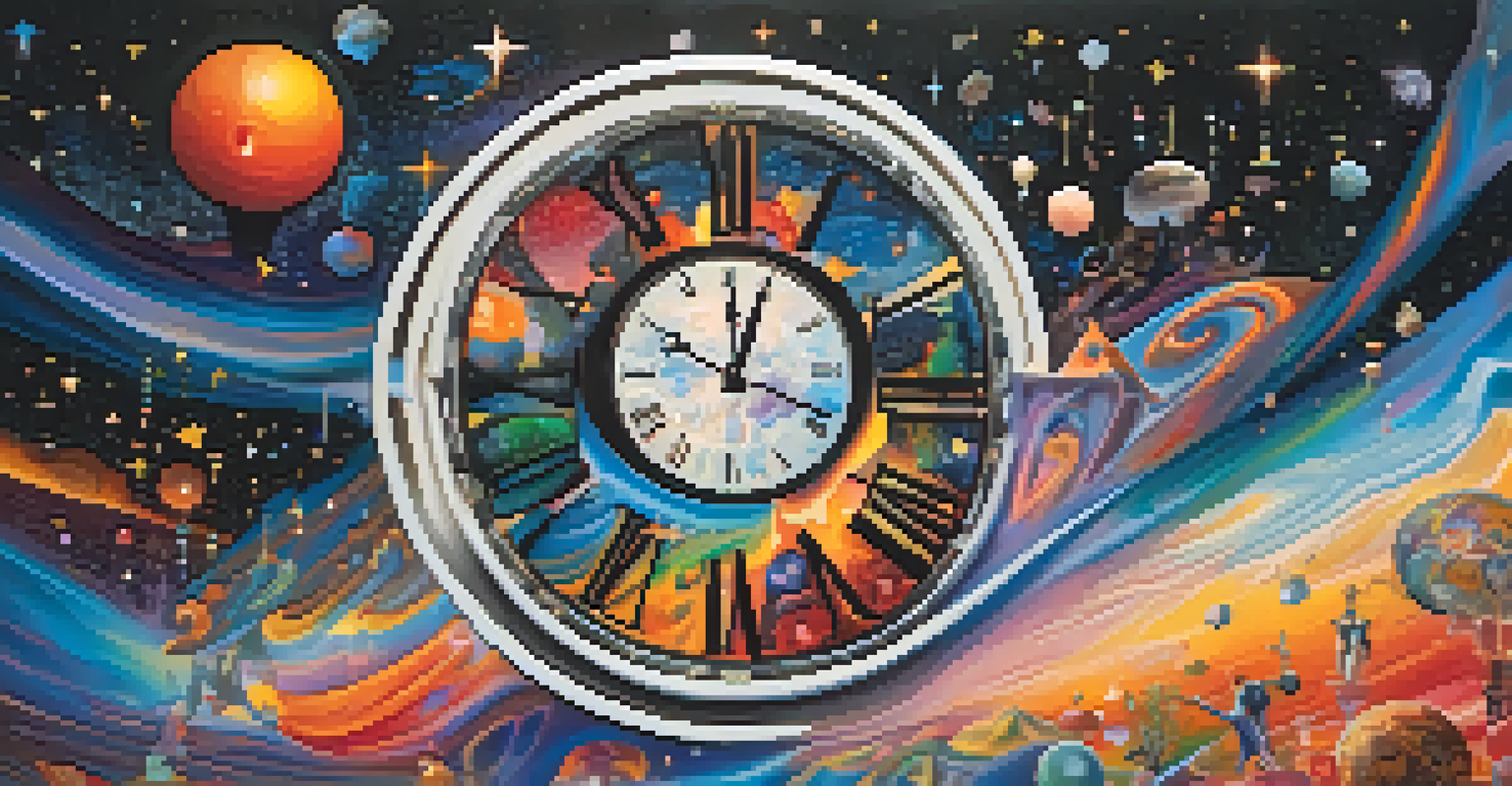Exploring the Subjective Experience of Time with Entheogens

Understanding Time as a Subjective Experience
Time is often viewed as a constant, but our experiences can vary widely. For instance, when you're engrossed in a favorite book, hours can feel like minutes. This subjectivity is what makes exploring time perception so intriguing, especially when entheogens are involved.
Time is a created thing. To say 'I don't have time,' is like saying, 'I don't want to.'
Entheogens, substances that induce altered states of consciousness, can significantly affect how we perceive time. Users often report feeling as though time has expanded or contracted during their experiences. This phenomenon provides a unique opportunity to study the fluidity of our temporal perceptions.
By examining these altered states, we can gain insights into the nature of time itself. This exploration can help us understand not only our subjective experiences but also the broader implications of how we relate to time in our everyday lives.
The Science Behind Time Perception
Research in psychology and neuroscience suggests that our brains process time in complex ways. Different areas of the brain are activated when we experience a moment of joy compared to a moment of fear. This suggests that our emotional state can significantly influence how we perceive time.

When under the influence of entheogens, these brain processes can be altered, leading to unique experiences of time. For example, substances like psilocybin may enhance sensory input, creating a sense of time dilation where moments seem to stretch on indefinitely.
Subjective Time Perception
Our experiences of time can vary greatly, especially under the influence of entheogens, which often lead to feelings of time dilation.
Understanding these scientific underpinnings helps us appreciate the profound effects of entheogens on our perception. It also opens up discussions about consciousness and how our subjective experiences shape our understanding of reality.
Entheogens and Altered States of Consciousness
Entheogens, such as ayahuasca or peyote, are often used in spiritual or therapeutic settings to induce altered states. These states can lead to profound insights and experiences that transcend ordinary perception. Many users report a feeling of unity with the universe, which often includes a radically different sense of time.
The only reason for time is so that everything doesn't happen at once.
In these altered states, time may feel cyclical rather than linear, leading individuals to perceive past, present, and future simultaneously. This can foster a deep sense of connection and understanding that challenges conventional views of time.
Such experiences not only enrich personal narratives but also encourage broader philosophical discussions about the nature of existence. They prompt us to consider how our perceptions shape our reality and the role of time within it.
Experiencing Time Dilation with Entheogens
Many users of entheogens report a phenomenon known as time dilation, where time seems to stretch. Imagine watching a sunset; in a normal state, it might take just a few minutes, but under the influence of entheogens, those moments can feel like eternity.
This experience can lead to profound realizations about life and existence. Users often express that they gain clarity about their relationships, purpose, or even their place in the universe during these elongated moments.
Cultural Influences on Time
Different cultures perceive time through various lenses, particularly in spiritual contexts where entheogens shape their understanding of existence.
Time dilation not only enhances the emotional impact of experiences but also provides a unique way to reflect on our lives. It encourages us to cherish moments that might otherwise pass unnoticed in our hectic daily routines.
Cultural Perspectives on Time and Entheogens
Different cultures have varied perspectives on time, often influenced by their spiritual practices, including the use of entheogens. Indigenous cultures have long utilized these substances in rituals, viewing time as a more fluid concept intertwined with nature and spirituality.
For many of these cultures, the experience of time during entheogenic rituals is an essential part of their worldview. It allows participants to connect with ancestors, understand their place in the universe, and reflect on the cycles of life.
This cultural context enriches our understanding of time perception, illustrating that the subjective experience of time is not just an individual affair but also a collective one deeply rooted in cultural beliefs.
Therapeutic Uses of Entheogens and Time Perception
In recent years, the therapeutic potential of entheogens has gained attention, particularly in treating mental health issues. Patients often describe their sessions as time bending, where they confront past traumas in a way that feels both immediate and distant.
This therapeutic approach highlights how altered perceptions of time can facilitate healing. By experiencing events from a different temporal perspective, individuals can gain insights and release emotional burdens that have weighed them down.
Therapeutic Potential of Entheogens
Entheogens are being explored for their therapeutic benefits, particularly in addressing mental health issues by altering time perception during healing experiences.
As more research emerges, the intersection of entheogens, time perception, and therapy could lead to groundbreaking methods for understanding and treating mental health challenges.
Reflections on Time and Existence After Entheogenic Experiences
After undergoing an entheogenic experience, many individuals find themselves reflecting deeply on the nature of time and existence. These reflections can lead to lasting changes in how they approach life, priorities, and relationships.
For instance, someone who has experienced time dilation may begin to appreciate the present moment more fully, recognizing its fleeting nature. This shift in perspective can foster a greater sense of mindfulness and gratitude in everyday life.

Ultimately, these experiences remind us that time is more than just a ticking clock; it's a rich tapestry of moments that shape who we are. Embracing this understanding can enrich our lives in profound ways.